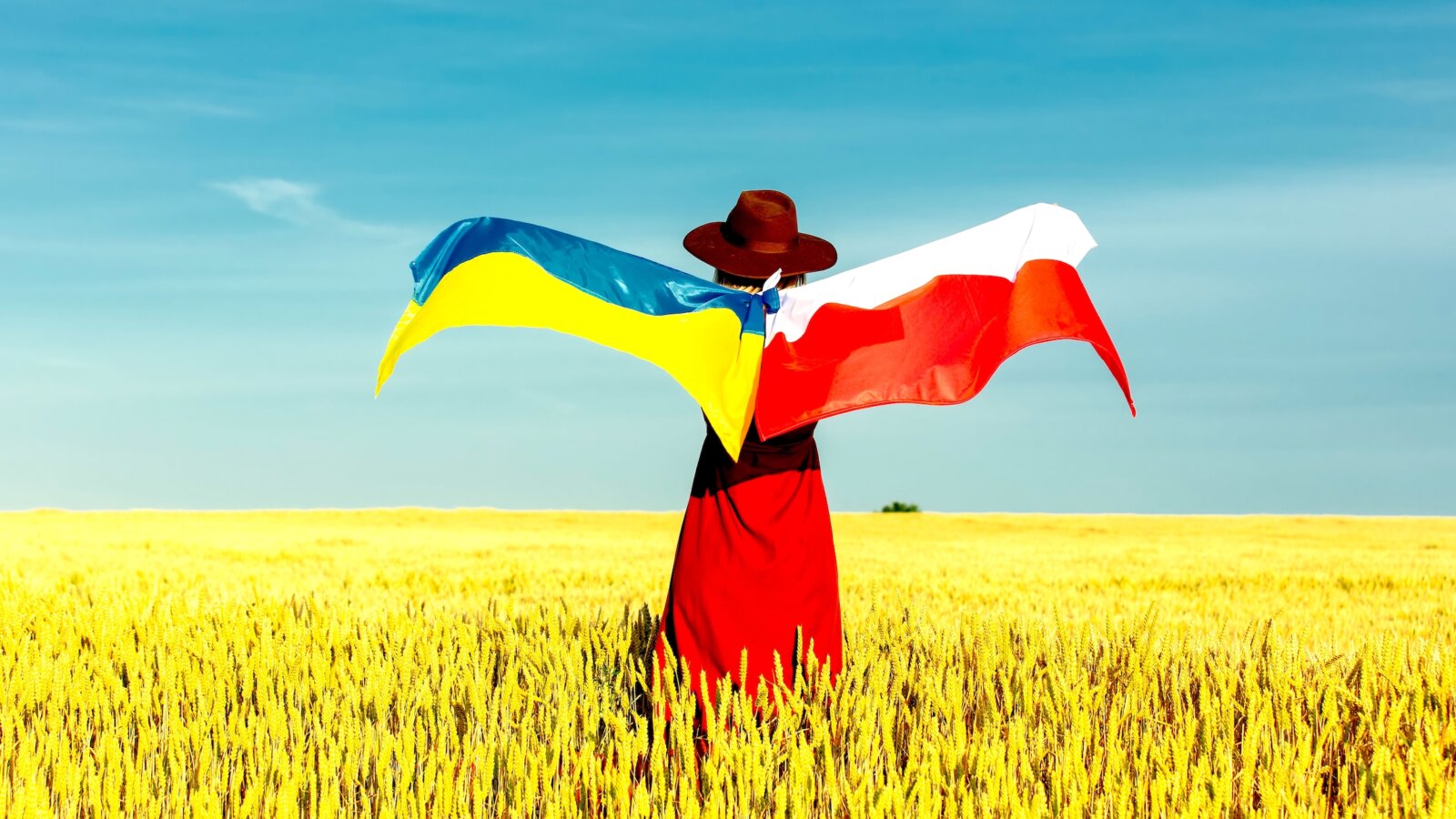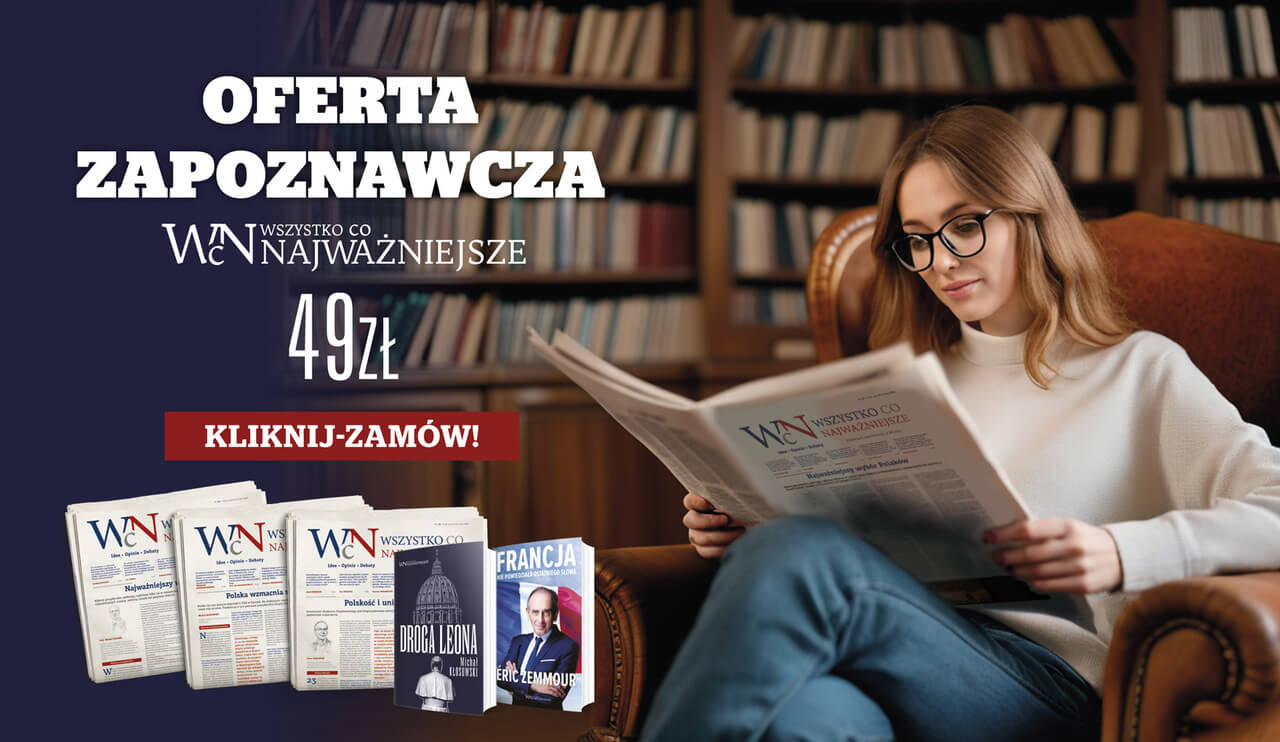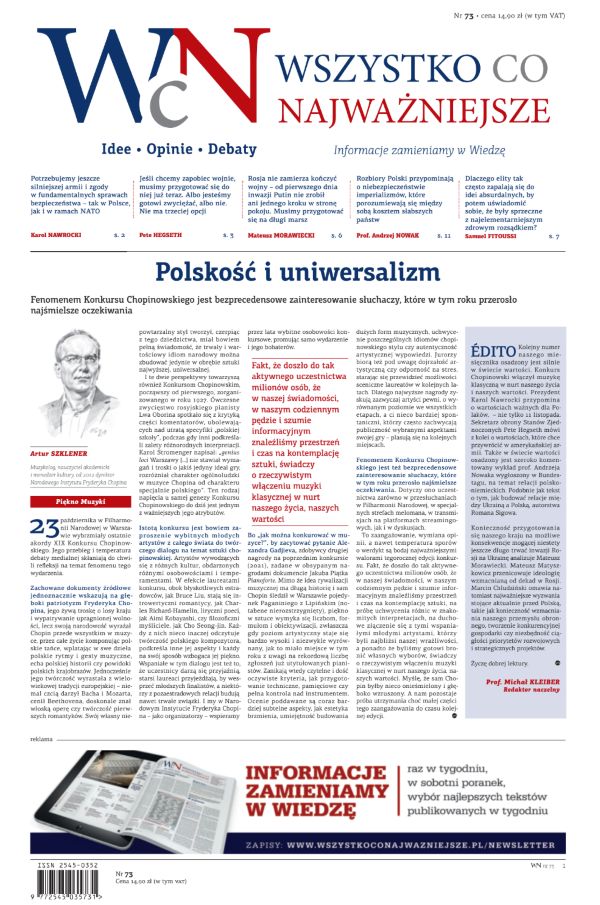
 On One Side of the Barricade
On One Side of the Barricade
Polish-Ukrainian partnership during wartime is the key to Europe’s security.
.There is a saying in Ukraine: “A neighbor is closer than a relative” because they are always nearby, so it’s worth having good relations. This applies to Ukraine and Poland as well. Let us focus on Ukraine’s current challenges, Polish-Ukrainian relations, and prospects for cooperation between our countries in the social, economic, and cultural spheres.
Ukraine has been fighting for its independence for the fourth year. The battlefield is not only the front line, which unfortunately moves westward every day, but also every city and village regularly bombarded by Russia with missiles and combat drones. Soldiers, children, women die every day. Before winter, Russians intensified attacks on energy infrastructure, planning a total blackout so Ukrainians would simply freeze. Power shortages mean electricity is supplied according to schedules—in Kyiv, outages last 8–15 hours, and in Dnipro or Kharkiv up to 20.
Moscow’s reach extends into Poland: arson attacks in Warsaw and Radom in 2024, regular cyberattacks, drone intrusion on September 10 of this year, and a terrorist act on railway tracks on the Warsaw–Lublin route on November 16. Hybrid warfare is particularly insidious because, in this case, it was carried out under a false flag, and the saboteurs turned out to be Ukrainian citizens—to sow discord between our states once again.
As Deputy Speaker of the Sejm Piotr Zgorzelski said:
“Every day of war in Ukraine, every day of helping the Ukrainian army fight Russia, is a gifted day of peace for Poland.”
Polish Entrepreneurs Invest in Ukraine Even During War
.In these difficult times, close cooperation between Ukraine and Poland at all levels—from state to personal—is especially important. I admit, I cried with joy when a Warsaw court refused to extradite to Germany a Ukrainian suspected of blowing up the Nord Stream pipelines, Volodymyr Zhuravlov, and released him from custody. And when lawyer Tymoteusz Paprocki said:
“No citizen of Ukraine can be prosecuted or convicted in the European Union for actions directed against Russia, and today’s district court decision confirms that,”
—I was grateful to the Polish judiciary because this is extremely important support in these hard days when every Ukrainian resists the enemy in any way possible.
“In Ukraine, we constantly feel Poland’s support, and not only military,” says Bohdan Bondarenko from Lviv. “For example, our neighbors sent us fire trucks, buses, hundreds of ambulances. I often see one of them on my street and mentally thank the community of Sopot because the inscriptions of this Baltic city were preserved on it.”
Economic cooperation during the war has not only not decreased but has actually grown. As Dariusz Szymczycha, Vice President of the Polish-Ukrainian Chamber of Commerce, says, before the war, the annual volume of mutual trade was $10.5 billion, and now it is $15.5 billion. Exports from Ukraine to Poland are 30% higher than before the full-scale invasion began. Polish entrepreneurs have not withdrawn their businesses from the war-torn country but are investing in it—since February 2022, they have opened almost 300 companies. In total, as of March 2025, 3,547 companies linked to Poland operate in Ukraine.
While Russia bombs cities daily, Polish entrepreneurs take the same risks as Ukrainians. For example, on the night of July 16, during an attack by Russian combat drones in Vinnytsia, a factory of the Polish company Barlinek was damaged, and eight people were injured. The plant specializes in wooden flooring—it did not produce military equipment or ammunition; it is a completely civilian business.
It’s no exaggeration to say that in every store in Ukraine you can buy Polish products, especially dairy. Likewise, in Poland, stores with Ukrainian products have become popular and well-liked by Poles.
At the beginning of July 2025, the Polish National Court Register recorded 29,044 companies owned by Ukrainians. Of these, 13,014 were opened after February 2022. According to the Polish Economic Institute, from early 2022 to April 2025, Ukrainian citizens established 88,500 sole proprietorships in Poland, including over 33,000 last year.
Art Is an Exchange of Kindness
.Daily life for Ukrainians during the war is hard: power outages, regular stays in shelters during air raid alerts, the threat of bombings, so good cinema is great therapy to escape worries.
“I enjoy attending screenings of the annual ‘Days of Polish Cinema’ festival, initiated in 2006 by the Polish Institute in Kyiv,” says Bohdan Bondarenko. “This year’s 20th anniversary edition took place in eight cities; films were shown in the original with Ukrainian subtitles, which allowed us to practice Polish pronunciation.”
In return, Polish cinemas show new Ukrainian films in the original with Polish subtitles; there are regular festivals, concerts, and exhibitions of Ukrainian artists, so Ukrainians in Poland do not feel culturally isolated.
After the full-scale invasion began, Ukrainian artist Daria Aloshkina moved to Kraków with her three children. “I use this opportunity to tell stories about our country, and from this perspective, art is now also a weapon. I organize paper-cutting workshops in Polish cities and other countries, and the proceeds go to the needs of the Armed Forces of Ukraine. Among the participants are Poles and compatriots from various corners of Ukraine, sometimes already without a home, without loved ones… And at that moment, creating paper cuttings becomes a kind of art therapy to regain peace of mind and maintain mental balance.”
“I admire that Ukrainians cherish their traditions: they paint Easter eggs, embroider shirts and wear them proudly, weave wreaths, make motanka dolls,” says Renata from Opole, who is also learning paper cutting. “And I noticed that my compatriots also remembered that their grandmothers painted eggs instead of buying chocolate ones, and recently I saw an announcement in our town about making straw spiders, which are Christmas decorations. Cultural exchange enriches both our nations!”
Refugees living in Poland learn a lot from Poles, but Poles also adopt good things from Ukrainians.
“I admit that ten years ago in my town, on Poland’s Independence Day, few people hung our white-and-red flags on private homes,” says Dorota from Bydgoszcz. “But seeing how Ukrainians value their flag, how they keep it in territories temporarily occupied by Russia—where they could be executed for it—I now see our flags on many houses on my street during holidays.”
Leave the Past to Historians
.As with any neighbors, Ukraine and Poland have had different periods in their relations. Polish politician and statesman Jacek Kuroń, born in Lviv, said that we have inflicted so many wrongs and grievances on each other in the past that for every complaint expressed by Poles, Ukrainians will respond: “And you previously did this,” and Poles will reply: “And you previously did that.” Then a domino effect begins, reaching, figuratively speaking, back to the times of Adam and Eve. Jacek Kuroń argued that searching for the guilty is an absolutely hopeless matter—we must end mutual accusations and reconcile.
A symbolic moment came on May 13, 2006, when the Presidents of Ukraine and Poland—Viktor Yushchenko and Lech Kaczyński—unveiled a monument to 366 Ukrainians who died in March 1945 in the Polish village of Pawłokoma at the hands of soldiers of the Home Army. “We have chosen the path of understanding,” Yushchenko said then. And it’s a pity we didn’t stay on that path.
“Meanwhile, Polish President Karol Nawrocki recently submitted to the Sejm a draft law on criminal liability for ‘promoting the ideology of Banderism.’ I’d like to give an example,” says Oleh Stetsyshyn, historian and researcher at the Lychakiv Cemetery Museum. “In the Sachsenhausen concentration camp, Stepan Bandera and the main commander of the ‘Armia Krajowa’ (Home Army), Stefan Rowecki ‘Grot’, were imprisoned at the same time. On July 22, 1943, they held a secret conversation and reached common conclusions. So why can’t we find a common language today?”
The Lychakiv Cemetery Museum is now an example of close cooperation between our nations in commemorating the dead: next to the monument to the Lviv Eaglets is the Pantheon of soldiers of the Ukrainian Galician Army. Moreover, since 2007, as part of the Polish-Ukrainian project
“Preserving Common Cultural Heritage,” more than 140 tombstones and 3 chapels have been restored in the cemetery. Among them are not only graves of prominent Polish figures such as Maria Konopnicka and Gabriela Zapolska but also monuments to Ukrainians—Ivan Franko and Markiyan Shashkevych.
“Indeed, relations between our countries are currently quite tense, without objective reasons—in my opinion,” says Volodymyr Viatrovych, Ukrainian historian, politician, and public figure. “On the contrary, objective reality should favor our rapprochement. I mean the threat from Russia, which concerns not only Ukraine but also Poland and all of Europe. The issue of the Volhynia tragedy and the activities of the UPA is a historical discussion about the past, in which historians should participate, not politicians. The involvement of politicians in this discussion adds nothing to understanding the past and only threatens normal relations in the present. Until history is depoliticized and politics is dehistorized in Poland, unfortunately, it will be difficult to talk about improving relations.
The Volhynia tragedy is a bloody conflict that must be remembered and studied, but not turned into a factor determining current relations. It must be understood that such conflicts, like those between Ukrainians and Poles during World War II, are not unique. In world history, they have occurred between neighboring nations, and the only way to resolve them is mutual forgiveness.
If today there is no readiness to talk about mutual forgiveness, then the best solution is to postpone these discussions for the future and focus on the threats that exist now. For me, as a historian and politician at the same time, the absolutely obvious lesson of the Polish-Ukrainian conflict during
World War II is that all these misunderstandings will always be exploited by a third party—and that third party is the same as now—Russia. This is a lesson that history does not speak about but screams. If we really want to learn something, let’s learn the most important thing: as soon as we start arguing, Moscow will definitely use it to its advantage and to the detriment of both Ukraine and Poland.”
Everyone Is Tired of War
.Poles are tired of the war because everyone thought it would last only a few weeks or months and Ukrainians would return home. “We do not expect the same support as in March 2022, when Poles shared clothes, food, and housing with us,” says Olena Ovchynnikova. “We, Ukrainians, who fled then with one bag and needed the most essential things, are grateful to them for that sincerity and generosity. Now we work and can provide for our basic needs. But many have nowhere to return to…”
Now it seems that there are so many Ukrainians in transport or on the streets. How is that possible, when there are about 38 million Poles and only one million Ukrainians? The explanation is that we do not have cars, so we use public transport; we do not have houses with yards where children could play; we live in small apartments or rent only a bed in a room for 10 people, so we spend free time in parks or playgrounds; we do not eat in restaurants and do not order catering, so there are many of us in supermarkets.
Sometimes I hear from Poles that they have a good opinion of Ukrainians, but not of those who live on social benefits. I want to say that such Ukrainians have never been and are not in Poland. Refugees from the war in 2022 received a one-time payment of 300 PLN from the Polish government; 800+ was paid only for children, and 40+—to Poles who hosted refugees. Refugees had access to medical care but did not burden the system because most of them are young and healthy people.
It is worth noting that, 15.21 billion PLN was the revenue to the state budget from Ukrainian emigrants in 2024, according to a report by ‘Bank Gospodarstwa Krajowego’, the amount of benefits paid under the ‘Family 800+’ program for children of war refugees totaled 2.8 billion PLN.
Unfortunately, Russia’s brutal war continues. If any Pole thinks they live in safety, that the Kremlin attacks only Ukraine, they are wrong. The common enemy reminds us every day that our nations stand on one side of the barricade and have one goal—security and development. Only together will we survive.



